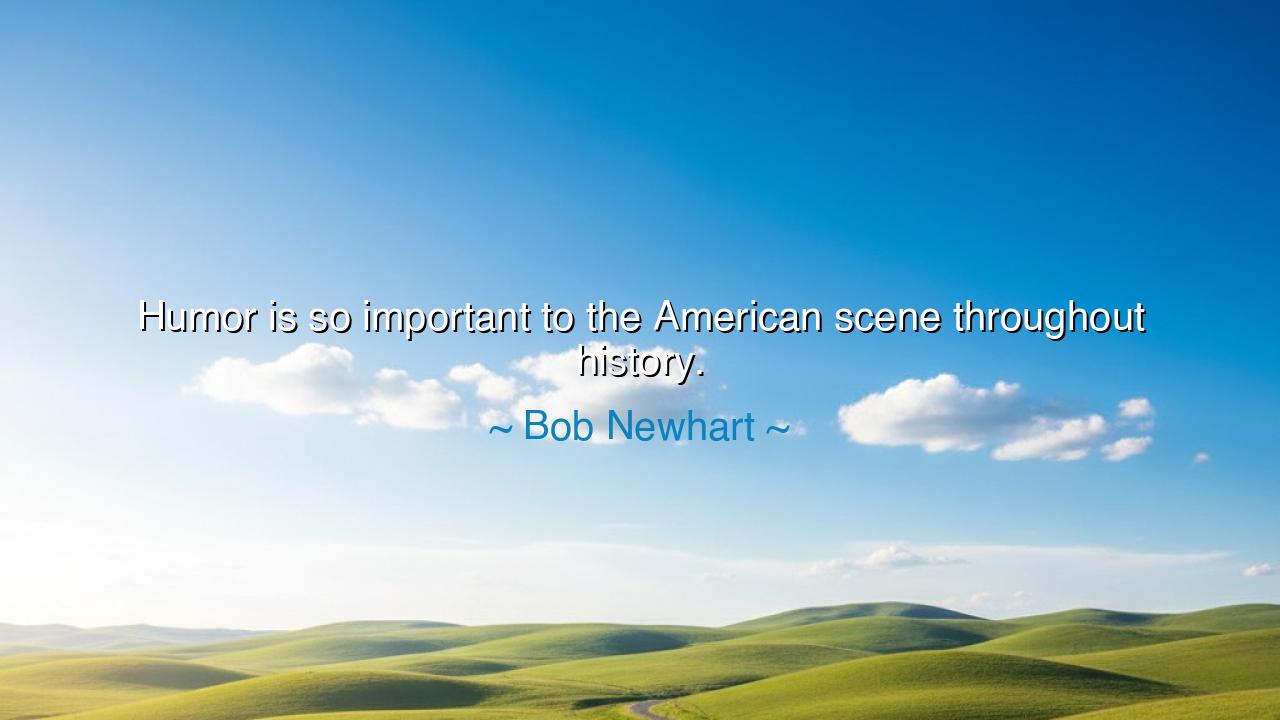
Humor is so important to the American scene throughout history.






Hear the words of Bob Newhart, the quiet sage of laughter, who once said: “Humor is so important to the American scene throughout history.” Though simple in form, this truth is vast and enduring. It speaks not only of jokes and laughter, but of resilience—of a nation’s soul that has learned to face tragedy with a smile, to turn chaos into comedy, and despair into defiance. For humor, in its truest form, is not merely amusement; it is strength disguised as joy. It is the whisper of courage that rises when the world grows dark.
From the birth of the republic to the present day, the American spirit has been tempered by humor. When the land was still young, and its people uncertain of their destiny, laughter became a kind of faith—a belief that no hardship was too great to overcome. The pioneers, crossing deserts and mountains, carried few possessions, but they carried stories, songs, and jokes. Around campfires and in cabins, laughter became light in the wilderness. Even in war and want, the people of America found solace in wit. This, as Newhart understood, was not frivolity—it was survival. To laugh in adversity is to claim one’s humanity in the face of fate.
The ancients would have recognized this spirit. The Greeks believed that laughter came from the gods, a gift from Dionysus, who taught mankind to celebrate even amidst sorrow. So too did America learn to weave humor into its struggles. Abraham Lincoln, burdened with the heaviest of sorrows, once said, “If I did not laugh, I should die.” His jokes were not born of joy, but of mercy—mercy toward himself and toward others who carried grief. In those moments, humor was the bridge between pain and endurance. It gave voice to what the soul could not bear to speak.
Bob Newhart, himself a man of quiet irony and gentle satire, stood within this great lineage of American humor. His style was never cruel or loud; it was rooted in the ordinary—those small absurdities that reveal the deeper truths of life. In a world that grew faster and noisier, he reminded his listeners that laughter could still be subtle, intelligent, and humane. In his words, we hear the echo of Mark Twain, who wielded humor as a mirror for society, showing that comedy could expose hypocrisy more powerfully than anger ever could. Both men understood what Newhart’s quote proclaims: that humor has always been America’s conscience, its self-reflection, its renewal.
The origin of this wisdom lies in the nation’s history of struggle. When the people were divided by war, humor softened their hatred. When they endured depression and poverty, comedians like Will Rogers gave them hope through wit. When injustice reigned, humor became the voice of protest—through satire, through irony, through truth disguised as laughter. Even in the darkest times, from the battlefields of Gettysburg to the smoke of September’s towers, Americans turned to humor not to escape, but to endure. It is through laughter that the nation reaffirms its life, its courage, its unbreakable will to rise again.
Yet this wisdom extends beyond borders and ages. For all peoples, laughter is a sign that the human spirit remains undefeated. It is the mark of those who can see beyond fear, who can look upon the absurdity of existence and still choose joy. The wise understand that humor is not weakness, but wisdom—it is philosophy made light, truth made bearable. The one who laughs does not deny suffering; they master it. Thus, Newhart’s words call us to remember that humor is not mere entertainment—it is heritage, medicine, and mirror.
Let this, then, be the lesson passed to all generations: never lose your laughter. Cherish humor as you would courage, for they are kin. When hardship comes, do not silence your joy; let it speak, even through tears. Laugh with kindness, not cruelty; with insight, not ignorance. And when you tell a story, remember that every jest can carry truth, and every smile can heal. For as Bob Newhart reminds us, humor has always been more than a pastime—it has been the quiet force that binds hearts, bridges divides, and keeps the flame of hope alive in the American soul.
So laugh, O traveler of time and trial. Laugh as your ancestors laughed through storms and wars. Laugh, not because life is easy, but because life is worth loving. In every age and every nation, laughter remains the echo of freedom. And in that echo, we find what is most human—and what is most divine.






AAdministratorAdministrator
Welcome, honored guests. Please leave a comment, we will respond soon